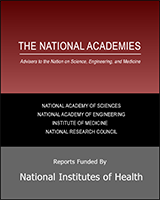Future Directions for Understanding the U.S. Health Disadvantage (original) (raw)
NCBI Bookshelf. A service of the National Library of Medicine, National Institutes of Health.
National Research Council (US); Institute of Medicine (US); Woolf SH, Aron L, editors. U.S. Health in International Perspective: Shorter Lives, Poorer Health. Washington (DC): National Academies Press (US); 2013.
The previous sections of this report have documented the scope of the U.S. health disadvantage (Part I) and have explored a range of potential factors that might explain why the United States is losing ground (Part II). We now turn to the question of what the nation should do about this situation.
As scientists, the panel is reluctant to answer the question without better evidence. Data are simply lacking to fully understand the causal factors responsible for each of the diseases and injuries that disproportionately affect the U.S. population. Even the scope of the U.S. health disadvantage is not fully understood because comparative data are lacking to fully compare population health across high-income countries. The statement of task from the study sponsor ended with this charge: “If insufficient evidence (data) exists currently to test new hypotheses, indicate the nature and extent of data that would be required.” That research agenda is presented in Chapter 9.
The statement of task also instructed the panel to set out “more effective public health strategies” for the future. The research agenda outlined in Chapter 9 may take years to complete, and the panel is convinced by the scope and size of the U.S. health disadvantage that more immediate steps can, and should, be taken now. Chapter 10 provides specific recommendations about intensifying efforts to address national health objectives that target the areas in which the United States is experiencing a disadvantage and alerting the American public to the problem. Chapter 10 speaks to the need to stimulate a national discussion about the implications of the U.S. health disadvantage and proposes a comprehensive study to learn from policies that have been used by other nations that have better health outcomes.
Many proposals for rectifying the U.S. health disadvantage will remain “informed speculation” until sophisticated research and hypothesis testing convincingly establishes their effectiveness in the United States. The scientific community faces challenges in conducting such research because of limitations in access to comparable cross-national data and methodological challenges in conducting studies to identify the causes and solutions of the U.S. health disadvantage. To address those challenges, Chapter 9 proposes several specific and important actions that could be taken now by the scientific community, research and health statistics agencies, and funders to establish an infrastructure for vibrant research and scholarship on the causes of the U.S. health disadvantage.
Copyright © 2013, National Academy of Sciences.
Bookshelf ID: NBK154475
